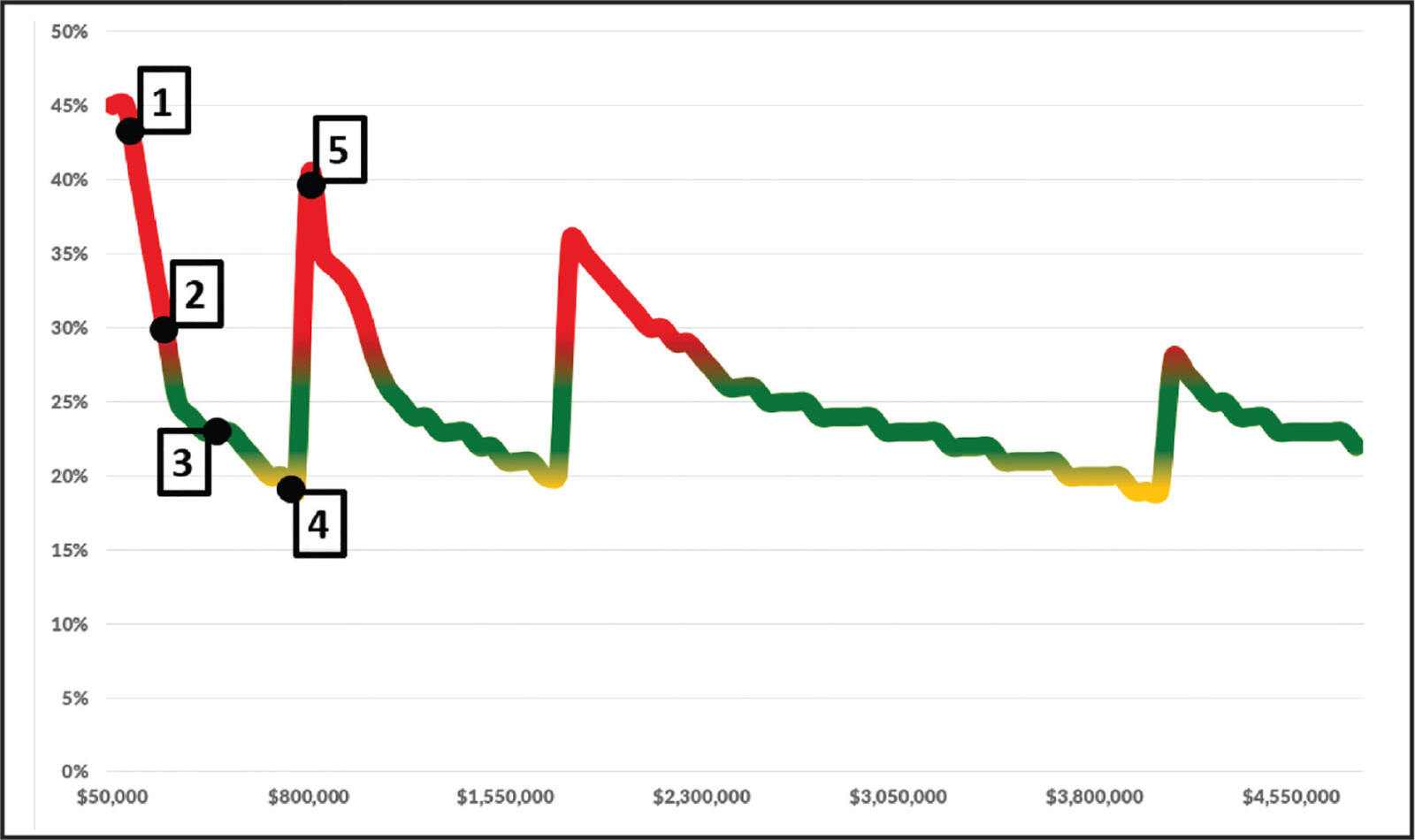January 1, 2016

Overhead ratios and company growth.
Overhead and growth:
Know when to hold ’em, fold ’em, walk or run
BY MARK BRADLEY
 Hopefully, managing your company’s overhead is nothing like playing a poker game. But don’t write off Kenny Rogers as a consultant just yet. Advice from The Gambler can help put your company’s growth and overhead planning into perspective.
Hopefully, managing your company’s overhead is nothing like playing a poker game. But don’t write off Kenny Rogers as a consultant just yet. Advice from The Gambler can help put your company’s growth and overhead planning into perspective.When you’re first getting a new business off the ground, hiring a foreman to replace you in the field is one of the first big steps. Then you have a few foremen. Then, you start to need some admin/overhead help. You start to feel like things are on the up-and-up, then you start having people and training problems that you never had when you were smaller. And right after you start to figure out the people problems, new problems arise. You’ll need a bigger shop/yard, and more equipment. The cycle repeats itself over and over again.
Many companies watch their profits fluctuate up and down with these business developments and changes. Jobs go well, when overhead is high as the crews are well managed. When overhead costs drop, profits should increase, but field productivity suffers because jobs aren’t managed well. At each stage of your businesses growth overhead goes up and down and up again. You can shave years of hard lessons and increase your bottom line by learning how to ‘surf’ these overhead waves.
The numbers suggested in the waves below are just averages. There are no hard and fast rules. Companies can be profitable at any size. The numbers below represent typical benchmarks for company growth and change.
Wave 1: The new company ($0 – 300K in sales)
When a new business starts out, overhead can be higher than you’d think! To be in this industry, you’re going to need a pickup, some equipment, a website, a phone, a laptop and other basics. But if your sales are $100 - $150K, those basic overhead expenses are going to eat up most of your revenue! Basic overhead expenses can eat up 30 – 50% of a new company’s revenue. It’s likely too much overhead to be able to price work competitively.Kenny’s advice: “Run”
The overhead graph is red at this stage. Small businesses can be profitable, but a typical landscape business must hit approximately $300K in revenue before it becomes consistently profitable. There’s plenty of advice out there saying, “Don’t grow too quickly.” Sometimes this is true, but this stage is not one of those times. Your overhead/operating expenses will eat up your income quickly. Grow your business quickly on guts and hard work and get to the $300K mark to start seeing some consistent profit.
Wave 2: The sustainable company ($300 – 500K)
Once a business hits about $300K in annual revenue, sales are enough to maintain some basic overhead expenses. The overhead graph here starts to turn from red to green. Now the business can afford some structure, the owner can draw a modest wage and will be looking for key people that can help expand capacity.Kenny’s advice: “Walk”
Now you can start to expect a consistent, but modest, profit. You can manage most of the business “in your head,” but this won’t last long, so start thinking about building systems to train people to do what you do. Keep growing, but focus on slower, more deliberate growth and systems that will help people replace you.
Wave 3: The profitable company ($500 – 700K)
This is a sweet spot. For many businesses, this wave is where the owner banks the most profit! The business is small enough that the owner can (almost) stay on top of everything. Sales are busy, but not quite overwhelming and there were just enough crews that one owner can manage the pulse of the daily goings on.Kenny’s advice: “Hold ‘em”
The overhead graph is solid green here. Enjoy this spot while you can. The next phase will feel like you’re starting your business all over again. Here’s a great spot to slow your growth down. Your overhead is likely fairly low, you can price work competitively and you can stash away some profit. If your goal is to keep growing those, invest those profits in systems, because you’re going to need them for the next waves!
Wave 4: The overwhelmed company ($700 – 900K)
Have you heard the story of the landscape contractor who made just as much net profit running one or two crews as he did running three or four? It’s true, and the same story has played out thousands of times. At this wave, the wheels start coming off. Too many sales meetings. Estimates are rushed out the door. There’s not enough time to plan/prepare jobs. Staff are new and untrained, and the business lacks structure and operating procedures. There are too many jobs for the owner to manage at once. In short, you’re overhead’s low enough to make good profit, but your efficiency and productivity is falling apart. You feel like you need help in the office, but that salary would would consume that profit you just got used to making.Kenny’s advice: “Fold ‘em” or “Run”
The overhead graph is a yellow here – be warned. You don’t want to get caught in this wave for long. You’re too busy, doing too many things, for not enough money. You have two options.
Fold ‘em – Kenny doesn’t mean close your doors, but he might suggest taking a small step backward. Sometimes, the best thing you can do is slow down. One option at this wave would be to dial back a bit, go back to Wave 3, and create some systems and procedures so that you have a solid foundation on which to grow.
Run – Feeling lucky (or ready)? Then here’s where you invest in overhead to grow… but make sure you grow quickly from here. The minute you pull the trigger on a new hire (or other significant overhead expense), your overhead just jumped back up in the red area again. It’s now too high to be profitable and/or competitive. Your job is to grow your company’s sales quickly so that your overhead ratio comes back to the green and you can be competitive, and profitable again.
Wave 5: THE (new) re-invented company ($900K – 1.1M)
Consider yourself almost a new company again. You’ve pulled the trigger on some overhead expenses and now you need to grow your sales, quickly, to get your overhead back down so that its manageable and affordable again.Kenny’s advice: “Run”
Grow your sales and drop your overhead expense ratio quickly. You won’t compete well on price with high overhead, so you need get it back to balance. Don’t tread water here. Get to the next wave quickly.
Just when you think you’ve made it to where things would get easy, this cycle will repeat itself over and over again. As soon as you solve problems, new and different problems will arise. Just because you broke a million in sales doesn’t mean you ‘made it.’ All it means is that you’re about to face new and different challenges and you need to be prepared to face them.
Sound a bit hopeless? It’s not. As you grow, these challenges become more and more familiar, and they get easier each time. And don’t forget, growth isn’t everything. You can run a great business of any size, just as long as you are profitable. So get to know where you can balance profits, work/life, and your ambition and you’ve got the recipe for a successful landscape business.
Mark Bradley is president of TBG Landscape and the Landscape Management Network (LMN), based in Ontario.